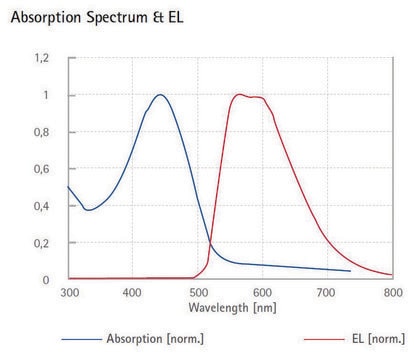698687
Poly[(9,9-di-n-octylfluorenyl-2,7-diyl)-alt-(benzo[2,1,3]thiadiazol-4,8-diyl)]
average Mn ≤25000
Sinónimos:
F8BT
About This Item
Productos recomendados
form
powder
Quality Level
mol wt
average Mn ≤25000
solubility
THF: soluble
chloroform: soluble
fluorescence
λex 447 nm; λem 530-560 nm in chloroform
Mw/Mn
<3
semiconductor properties
P-type (mobility=4×10−3 cm2/V·s)
¿Está buscando productos similares? Visita Guía de comparación de productos
General description
Application
Storage Class
11 - Combustible Solids
wgk_germany
WGK 3
flash_point_f
Not applicable
flash_point_c
Not applicable
ppe
Eyeshields, Gloves, type N95 (US)
Certificados de análisis (COA)
Busque Certificados de análisis (COA) introduciendo el número de lote del producto. Los números de lote se encuentran en la etiqueta del producto después de las palabras «Lot» o «Batch»
¿Ya tiene este producto?
Encuentre la documentación para los productos que ha comprado recientemente en la Biblioteca de documentos.
Artículos
The development of high-performance conjugated organic molecules and polymers has received widespread attention in industrial and academic research.
Since their discovery, organic light emitting devices (OLEDs) have evolved from a scientific curiosity into a technology with applications in flat panel displays and the potential to revolutionize the lighting market. During their relatively short history, the technology has rapidly advanced, and device efficiencies have increased more than 20-fold, approaching the theoretical limit for internal quantum efficiencies.
Organic photovoltaics (OPVs) represent a low-cost, lightweight, and scalable alternative to conventional solar cells. While significant progress has been made in the development of conventional bulk heterojunction cells, new approaches are required to achieve the performance and stability necessary to enable commercially successful OPVs.
Nuestro equipo de científicos tiene experiencia en todas las áreas de investigación: Ciencias de la vida, Ciencia de los materiales, Síntesis química, Cromatografía, Analítica y muchas otras.
Póngase en contacto con el Servicio técnico
![Poly[(9,9-dioctylfluorenyl-2,7-diyl)-co-bithiophene] 99.9%](/deepweb/assets/sigmaaldrich/product/structures/309/000/8b4a3f54-7765-4aca-96c4-74ce328d455d/640/8b4a3f54-7765-4aca-96c4-74ce328d455d.png)

![Poly[2-methoxy-5-(2-ethylhexyloxy)-1,4-phenylenevinylene] average Mn 40,000-70,000](/deepweb/assets/sigmaaldrich/product/structures/344/488/b8f8179d-3970-4deb-a754-adda88cdb36f/640/b8f8179d-3970-4deb-a754-adda88cdb36f.png)
![Poly[(9,9-di-n-octylfluorenyl-2,7-diyl)-alt-(benzo[2,1,3]thiadiazol-4,8-diyl)] average Mw >20,000](/deepweb/assets/sigmaaldrich/product/structures/428/661/1c4ebb98-9d51-48c0-96c7-e556ca425aa4/640/1c4ebb98-9d51-48c0-96c7-e556ca425aa4.png)


![Poly[(9,9-dioctylfluorenyl-2,7-diyl)-alt-(6,6′-{2,2′-bipyridine})] Mw ≥10,000 Da by GPC](/deepweb/assets/sigmaaldrich/product/structures/229/416/b7bc5f74-105e-4593-b0f8-f605aee79aec/640/b7bc5f74-105e-4593-b0f8-f605aee79aec.png)

![Poly[(m-phenylenevinylene)-co-(2,5-dioctoxy-p-phenylenevinylene)] light-emitting polymer, predominantly trans](/deepweb/assets/sigmaaldrich/product/structures/249/040/9442b889-4fa0-4b4a-b424-cff0769a5ef2/640/9442b889-4fa0-4b4a-b424-cff0769a5ef2.png)